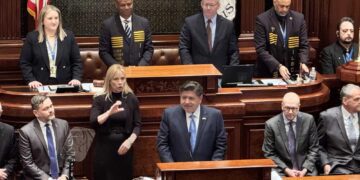By Dennis Cook -
So far this year we have seen that the new federal government means big changes for the country. In order to move into the future, sometimes it is necessary to revisit the past and make corrections. An important issue that needs a second look came from Illinois’s own Senator Dick Durbin, who included an amendment in the Dodd-Frank Wall Street Reform Act.
The Durbin amendment was an under-the-radar attempt by retail lobbyists to increase their client’s bottom line. Without any hearings or studies before its implementation, the amendment was included in the massive Dodd-Frank Wall Street Reform Act to change a marketplace that had nothing to do with the financial crisis. This legislation placed price controls on the fees retailers pay to accept debit card transactions, effectively eliminating the free market system for interchange fees, which are used to operate the complicated and dynamic global electronic payments system.
Make no mistake about it, this amendment infringes on the freedom of our economy and the rights of consumers like you and me.
Big box retailers capitalized on the anti-bank sentiment prevalent during Wall Street reform discussions and convinced Democrats to sneak this amendment into the reform package. Plain and simple, the Durbin amendment is a special interest bill that provides retailers with about $8 billion every year. That means since the bill went into effect six years ago, big box retailers have pocketed $42 BILLION.
The real kicker comes when you learn that the amendment was included because these retailers promised to pass along the annual $8 billion to their customers—you. That would have been nice, but do not hold your breath for those savings. A study by the Richmond Federal Reserve shows just one percent of retailers are actually passing along savings in the form of lower prices. Evidence shows the majority of retailers are pocketing the savings, with 22 percent of merchants actually INCREASING prices after Durbin.
It is not just customers that get the short end of the stick. Community banks and credit unions with less than $10 billion in assets were supposed to be exempt from the Durbin amendment’s price controls. This would have protected these local financial institutions from additional regulatory burden. Unfortunately, the exemption did not work. Leaders in the banking and credit union communities are vocal about the harm the amendment has imposed, noting that at the end of the day, it is their customers and communities that are really being hurt.
In fact, a study by the Credit Union National Association found estimated reduced revenue of $1.1 billion for credit unions due to the Durbin amendment. This unintended consequence is having a very real impact on institutions that bolster our hometowns here in Illinois.
Before this special interest bill, interchange fees were determined by the competitive free market and small merchants selling small ticket items received discounts. Senator Durbin’s price controls eliminated the free market which means the system no longer has the same flexibility. At the end of the day, this is bad news for Main Street businesses, like the local coffee shop or hardware store, and good news for big box retailers that sell higher priced items like TVs and furniture. Now the small guys are paying the same flat fee like the big box stores, while trying to remain competitive with less of a profit margin.
And don’t forget about that $8 billion a year that should be going to lower prices for consumers. These price controls have gone on for long enough. It is time to repeal the Durbin Amendment.
Dennis Cook is Chairman of the National Young Republican Federation.







